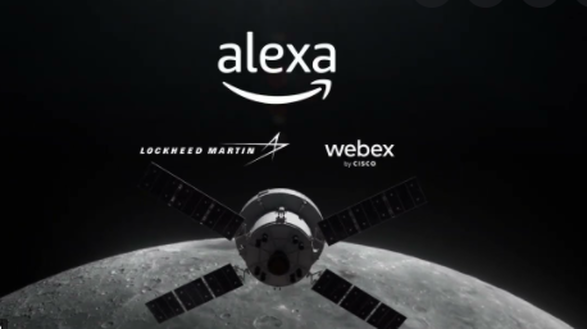"Alexa, how far to the moon? Yep you heard it right Amazons Alexa is going to the moon."--Mila Boyden, 6th grade
Alexa, how far to the moon? Yep you heard it right Alexa is going to the moon. Amazon's Alexa voice activated assistant is going to be part of the Artemis 1 mission, which according to NASA.gov is the first in a series of increasingly complex missions that will enable human exploration to the Moon and Mars. The mission should launch as soon as March 2022.
Alexa would be part of a voice activated assistant on the Orion spacecraft called Callisto. According to The Washington Post, the Orion spacecraft will be outfitted with screens that display Webex by Cisco, the communications platform that, like Zoom, allows users to see each other and share critical information. Astronauts could ask Callisto things like, “How fast are we going?” or “How far is it to the moon?” The Callisto is supposed to be able to give real time information to the astronauts aboard the Orion spacecraft.
According to the same The Washington Post article, “Callisto would help translate different languages so astronauts from all over the world could communicate. It would also help controllers on the ground share information over a screen, the way company offices communicate remotely,”.
Wesh.com states that it's all part of a collaboration between Amazon, Cisco, and Lockheed Martin, who built the Orion capsule for NASA. Lockheed approached the other two companies with the idea of developing a virtual assistant about three years ago, the companies said, and they are paying the full cost of including the virtual assistant on the Artemis 1 mission. Lockheed is also reimbursing NASA for any help the agency has lent on this project through an arrangement called a Space Act Agreement, which allows the space agency to be compensated for expertise or resources it gives to companies working on certain space-related projects.
The Artemis 1 mission will be uncrewed, but if it goes well it could be a major advancement towards the exploration of space.
Alexa would be part of a voice activated assistant on the Orion spacecraft called Callisto. According to The Washington Post, the Orion spacecraft will be outfitted with screens that display Webex by Cisco, the communications platform that, like Zoom, allows users to see each other and share critical information. Astronauts could ask Callisto things like, “How fast are we going?” or “How far is it to the moon?” The Callisto is supposed to be able to give real time information to the astronauts aboard the Orion spacecraft.
According to the same The Washington Post article, “Callisto would help translate different languages so astronauts from all over the world could communicate. It would also help controllers on the ground share information over a screen, the way company offices communicate remotely,”.
Wesh.com states that it's all part of a collaboration between Amazon, Cisco, and Lockheed Martin, who built the Orion capsule for NASA. Lockheed approached the other two companies with the idea of developing a virtual assistant about three years ago, the companies said, and they are paying the full cost of including the virtual assistant on the Artemis 1 mission. Lockheed is also reimbursing NASA for any help the agency has lent on this project through an arrangement called a Space Act Agreement, which allows the space agency to be compensated for expertise or resources it gives to companies working on certain space-related projects.
The Artemis 1 mission will be uncrewed, but if it goes well it could be a major advancement towards the exploration of space.


